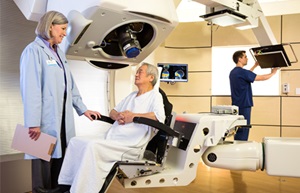Proton Therapy

Proton beam therapy is a type of external-beam radiation that uses protons instead of X-rays. It allows clinicians to shape the radiation dose precisely to the tumor while reducing exposure to nearby normal tissues. This technique can be especially helpful for tumors near critical organs, select re-irradiation cases and many pediatric cancers.
The potential benefit of proton therapy depends on your tumor type, location and anatomy. Our team will assess whether proton therapy offers a meaningful advantage to you. We will guide you along the way and help with insurance coverage.
Tumors commonly treated with proton therapy include:
- Base of skull
- Brain
- Breast
- Gastrointestinal
- Head and neck
- Lung
- Melanoma of the eye
- Pediatric
- Prostate
- Sarcomas
- Spinal
- Re-irradiation regardless of anatomical site
Proton therapy is available at the Northwestern Medicine Proton Center in Warrenville.
Next step: Schedule a Northwestern Medicine consultation to determine if proton therapy is suitable for your care.
To learn more, visit protoncenter.nm.org .
